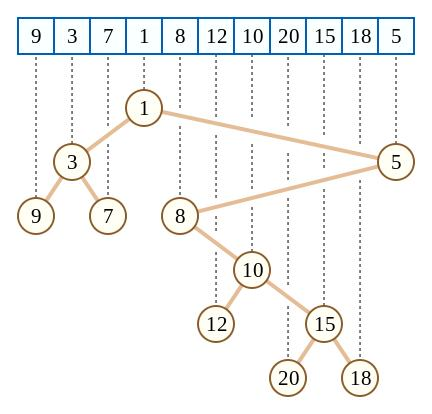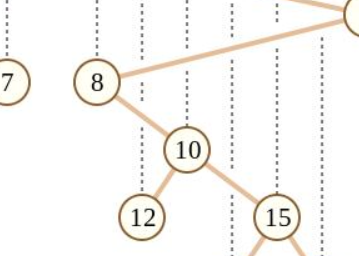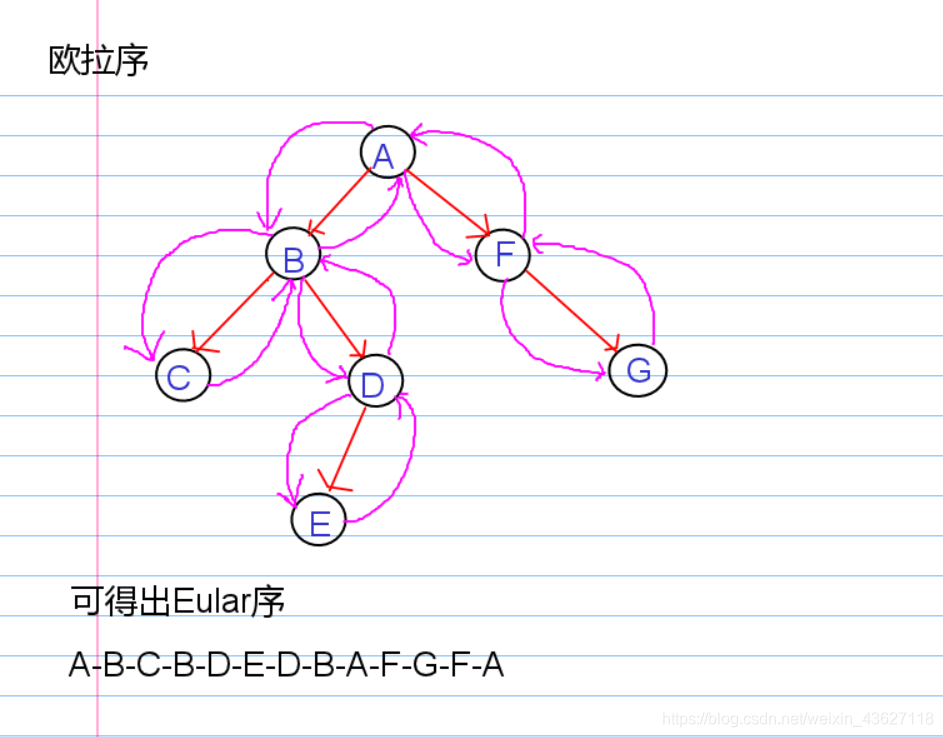四毛子算法教学
介绍
四毛子算法是一种可以接近 \(O(n)\) 级求解 \(RMQ\) 问题的算法,正宗的四毛子算法涉及到比较多的知识点且常数较大,我们常常使用朴素的简化版四毛子算法。
正宗四毛子算法引入
1. 什么是笛卡尔树
笛卡尔树如果你接触过平衡树,那将并不会陌生,它是 \(treap\) 的一种,当然常常的,我们为了维护序列上的平衡树,即文艺平衡树,以下标作为键值。
稍微提提与线段树对标的文艺平衡树是什么东西,且它的优势之处。对于普通的平衡树而言,它是一种以值作为比较对象的平衡二叉树,即左子树的值都比当前节点小,右子树则比自身大,那么我们如果将这个值换成下标,则左子树是比自身下标小的数,右子树是比自身下标大的数。那么显而易见,中序遍历拿到的序列,是从下标小的到下标大的,即为原序列。
笛卡尔树是一种 \(treap\),在满足上述前提,同时满足堆的特性,我们在文艺平衡树中如果以 \(rnk\) 作为它的堆的比较值,那么它就是一棵正儿八经的 \(treap\) 了。而在 \(RMQ\) 问题中,我们常常以该下标处的值为堆的比较对象。

如图所示,容易看出笛卡尔树不仅下标作为了 \(BST\) 的键值,它的 \(val\) 也作为了堆的优先级,越上面的越小,这是个小根堆。
怎么建树?这里有一种单调栈建法,以小根堆为例,我们单调栈维护 \(val\) 从小到大的递增栈,那么我们从左往右依次加,栈中即为在当前插入点下标更小的元素,对于当前节点来说,如果在它之前且比它大的最后一个元素,显然即为它的左儿子。而栈顶即为最近下标比它小,且值也比它小,理应它为对方的右儿子。
参照大根堆建树代码
int root; int a[N]; int child[N][2]; inline void build() { stack<int> st; forn(i, 1, n) { int last = 0; while (!st.empty() and a[st.top()] < a[i])last = st.top(), st.pop(); if (!st.empty())child[st.top()][1] = i; child[i][0] = last, st.push(i); } while (!st.empty()) { if (st.size() == 1)root = st.top(); st.pop(); } }
那么笛卡尔树的特点,我们可以用来干嘛?首先最基础的一点,大部分的 \(BST\) 都可以类似线段树一样,从中间往两边递归建树,满足 \(\log{n}\) 的期望高度,而如果我们的 \(treap\) 如果也参照如此,那么很显然会破坏堆的性质,虽然在平衡树当中 \(rnk\) 仅仅只是防止退化,不满足堆的特点也没关系。但我们可以利用这种建树方式,也可以达到 \(O(n)\) 级建造 \(treap\) 类树。
另一个特点,堆的特点。对于 \([l,r]\) 的 \(rmq\) 结果即为它们的 \(LCA\) 对应的值。
稍微证明下:

例如以这个为例,我们容易知道 \(val=10\) 的点的父亲的下标一定是 \(<left_{all}\),所以这个容易推广到所有情形,对于一个 \(LCA\) 来说它的父亲及其以上部分的点都一定不包括 \([l,r]\) 区间。而从 \(l \rightarrow LCA\) 和 \(LCA \rightarrow r\),这两条路径中。

显然 \(l \rightarrow LCA\) 要么直接走到,要么中途经历了拐弯。直接走到很简单,但很显然有一个显而易见的性质,\(l\le LCA \le r\),这个性质来源于左右子树,而 \(LCA\) 又是在 \(fa(LCA)\) 之下的最高点,即以 \(LCA\) 作为的堆顶的堆的顶点,它上方的 \(fa\) 要么
\(< [l,r]\) 要么 \(>[l,r]\),一定不在 \([l,r]\) 中,得证。这样一来,我们就可以把 \(RMQ\) 问题改为树上 \(LCA\) 问题了。
2.欧拉序求LCA怎么求
欧拉序有常见的两种:

这个就是第一种,这种我们只需要在 \(dfs\) 每个相邻节点结束加入即可,同时记录最早访问时间,即为 \(dfn\) 序。容易观察到每个点至多有 \(\text{度数} +1\) 个点,总个数为 \(2 \times n-1\) ,这个我们可以根据树的总边数为 \(n-1\),然后每个点至少访问一次共 \(n\) 次,所以总共为 \(2n-1\)。
特点:
-
欧拉序上任意两个点最先出现的时候之间出现的点深度最浅的即为 \(LCA\),根据 \(dfs\) 的过程不难得知这是正确的,因为我们是从一个点往上回溯到 LCA 再遍历另一个点。
-
欧拉序任意两个点的深度之差为 \(1\) 或者 \(-1\)。不难得知这也是正确的,因为我们 \(dfs\) 向下或者回溯向上递归一层就会加入一个点。
另一种即为常说的 \(dfs\) 序,特点就是一个点的 dfs 序的起点和终点即为子树上的点,在这篇文章中不再赘述。
那么知道这个性质以后,我们求出欧拉序以后,直接使用 \(ST\) 表,维护每个 \(2^i\) 次方长的答案即可,两段 \(2^i\) 次方长的答案拼成一段 \(2^{i+1}\) 长的答案,即根据这两段答案的 \(deep\) 比较,谁更浅当然谁就是这段的 \(LCA\) 了。这样就可以欧拉序求出 LCA 了。当然这种 \(m\log{m},m=2n-1\) 的预处理以后,我们可以做到 \(O(1)\) 回答 \(LCA\),当然预处理也可以通过分块 \(ST\) 表做到 \(O(m)\),接下来阐述。
3. 分块+ST表
这是一个个人觉得比较天才的东西,确保这两个知识点你已经很熟悉了。我们知道 \(ST\) 表的复杂度瓶颈为 \(O(n\log{n})\) 的预处理,那么如果我们预处理要求只能使用 \(O(n)\),我们能做到什么程度?前人已经帮我们回答了这个问题:
如果我们取块长为 \(\dfrac{\lceil \log{n}\rceil}{2}\),则有块数为:\(\dfrac{2n}{\lceil \log{n}\rceil}\),我们预处理出每个块的答案,然后把每个块看做单点,作为 ST 表维护的区间信息,即 \([l,r]\) 为第 \(l\) 块到第 \(r\) 块的答案。这样一来实际在 ST 表中的 \(n=\dfrac{2n}{\lceil \log{n}\rceil}\),那么我们的预处理复杂度变为了:
而在 \(2e7\) 左右的条件下,块长仅仅为 \(14\) 左右。所以对于散块而言,其实直接有的人觉得可以暴力:\(O(14)\) 了,但在刻意制造数据下 \(14n\) 并不小,我们继续尝试优化散块复杂度。
4.+-1 的 RMQ 问题
注意到欧拉序的特点,相邻两个数深度要么 \(+1\),要么 \(-1\),那么对于每个块而言我们可以把这个信息记录下来,可以考虑状压,\(+1\) 就是 \(0\) 相比于前一个点高度 \(+1\),而 \(-1\) 用 \(1\) 记录,则是相比较于前一个点深度为 \(-1\)。现在询问你深度最浅的点。
\(+1-1-1=011\) 这样压缩以后,我们深度变化就可以知道了 \(1,0,-1\),显然最浅的点为 \(3\) 这个位置对应的点。那么散块提取出来的实际上就是一种 \(+1+1-1...\) 这种序列的状压情况。我们观察到 \(siz\) 不大,在 \(2e7\) 以下也仅仅为 \(14\),实际写一下:
\(2^{\dfrac{\lceil \log{n}\rceil}{2}}=\sqrt{n}\),并不是很大,那么我们可以枚举所有的 \(+1-1\) 对应的状压情况,并处理出这种情况下的答案,枚举的时候注意到还有枚举序列求答案,那么预处理复杂度为:
这个复杂度极小,那么我们可以求出每种状态数从开头往后走完最佳答案位置。我们对于一个散块的 \([l,r]\) 查询而言,根据掩码位运算,使得当前块的状压量只保留 \([l,r]\) 的情况,并且需要移动使得 \(l\) 处对齐到开始位置,保证是从 \(l\) 位置开始时候的真正状态情况,就能做到 \(O(1)\) 了。\(idx\) 求出该点在块中 \(id\),\(pos\) 为获取块 \(id\),\(Diff\) 则为每个块的状压数,\(minIdx\) 则为每种状态量对应的答案位置,我们将 \(l\) 加上这个偏移位置就正确了。
inline int query(const int l, const int r) { const int L = idx(l), R = idx(r); const int status = (Diff[pos(l)] & (1 << R) - 1) >> L; return a[eulr[l + minIdx[status]]]; }
例题:P3793 由乃救爷爷
正宗的四毛子常数是巨大的,因为要建树:\(O(n)\),遍历树获得欧拉序 \(O(n)\),\(m=2n-1\),构建 \(ST\) 表:\(O(m)\),预处理每个块的状压数和每种状态量答案:\(O(m+\sqrt{m}\times \dfrac{log{m}}{2})\),总的预处理复杂度为:\(6n\) 左右,前提是不加上预处理分块的起点终点那些辅助数组以及 \(LOG2\) 之类的东西。除此之外,空间开销也是巨大的,所以并不常用,给出一份本题正宗四毛子实现代码,有些点会 \(MLE\)。
参照代码
#include <bits/stdc++.h> // #pragma GCC optimize(2) // #pragma GCC optimize("Ofast,no-stack-protector,unroll-loops,fast-math") // #pragma GCC target("sse,sse2,sse3,ssse3,sse4.1,sse4.2,avx,avx2,popcnt,tune=native") #define isPbdsFile #ifdef isPbdsFile #include <bits/extc++.h> #else #include <ext/pb_ds/priority_queue.hpp> #include <ext/pb_ds/hash_policy.hpp> #include <ext/pb_ds/tree_policy.hpp> #include <ext/pb_ds/trie_policy.hpp> #include <ext/pb_ds/tag_and_trait.hpp> #include <ext/pb_ds/hash_policy.hpp> #include <ext/pb_ds/list_update_policy.hpp> #include <ext/pb_ds/assoc_container.hpp> #include <ext/pb_ds/exception.hpp> #include <ext/rope> #endif using namespace std; using namespace __gnu_cxx; using namespace __gnu_pbds; typedef long long ll; typedef long double ld; typedef pair<int, int> pii; typedef pair<ll, ll> pll; typedef tuple<int, int, int> tii; typedef tuple<ll, ll, ll> tll; typedef unsigned int ui; typedef unsigned long long ull; typedef __int128 i128; #define hash1 unordered_map #define hash2 gp_hash_table #define hash3 cc_hash_table #define stdHeap std::priority_queue #define pbdsHeap __gnu_pbds::priority_queue #define sortArr(a, n) sort(a+1,a+n+1) #define all(v) v.begin(),v.end() #define yes cout<<"YES" #define no cout<<"NO" #define Spider ios_base::sync_with_stdio(false);cin.tie(nullptr);cout.tie(nullptr); #define MyFile freopen("..\\input.txt", "r", stdin),freopen("..\\output.txt", "w", stdout); #define forn(i, a, b) for(int i = a; i <= b; i++) #define forv(i, a, b) for(int i=a;i>=b;i--) #define ls(x) (x<<1) #define rs(x) (x<<1|1) #define endl '\n' //用于Miller-Rabin [[maybe_unused]] static int Prime_Number[13] = {0, 2, 3, 5, 7, 11, 13, 17, 19, 23, 29, 31, 37}; template <typename T> int disc(T* a, int n) { return unique(a + 1, a + n + 1) - (a + 1); } template <typename T> T lowBit(T x) { return x & -x; } template <typename T> T Rand(T l, T r) { static mt19937 Rand(time(nullptr)); uniform_int_distribution<T> dis(l, r); return dis(Rand); } template <typename T1, typename T2> T1 modt(T1 a, T2 b) { return (a % b + b) % b; } template <typename T1, typename T2, typename T3> T1 qPow(T1 a, T2 b, T3 c) { a %= c; T1 ans = 1; for (; b; b >>= 1, (a *= a) %= c)if (b & 1)(ans *= a) %= c; return modt(ans, c); } template <typename T> void read(T& x) { x = 0; T sign = 1; char ch = getchar(); while (!isdigit(ch)) { if (ch == '-')sign = -1; ch = getchar(); } while (isdigit(ch)) { x = (x << 3) + (x << 1) + (ch ^ 48); ch = getchar(); } x *= sign; } template <typename T, typename... U> void read(T& x, U&... y) { read(x); read(y...); } template <typename T> void write(T x) { if (typeid(x) == typeid(char))return; if (x < 0)x = -x, putchar('-'); if (x > 9)write(x / 10); putchar(x % 10 ^ 48); } template <typename C, typename T, typename... U> void write(C c, T x, U... y) { write(x), putchar(c); write(c, y...); } template <typename T11, typename T22, typename T33> struct T3 { T11 one; T22 tow; T33 three; bool operator<(const T3 other) const { if (one == other.one) { if (tow == other.tow)return three < other.three; return tow < other.tow; } return one < other.one; } T3() { one = tow = three = 0; } T3(T11 one, T22 tow, T33 three) : one(one), tow(tow), three(three) { } }; template <typename T1, typename T2> void uMax(T1& x, T2 y) { if (x < y)x = y; } template <typename T1, typename T2> void uMin(T1& x, T2 y) { if (x > y)x = y; } struct { unsigned z1, z2, z3, z4, b; unsigned rand_() { b = (z1 << 6 ^ z1) >> 13; z1 = (z1 & 4294967294U) << 18 ^ b; b = (z2 << 2 ^ z2) >> 27; z2 = (z2 & 4294967288U) << 2 ^ b; b = (z3 << 13 ^ z3) >> 21; z3 = (z3 & 4294967280U) << 7 ^ b; b = (z4 << 3 ^ z4) >> 12; z4 = (z4 & 4294967168U) << 13 ^ b; return z1 ^ z2 ^ z3 ^ z4; } void srand(const unsigned x) { z1 = x; z2 = ~x ^ 0x233333333U; z3 = x ^ 0x1234598766U; z4 = ~x + 51; } int read() { int a = rand_() & 32767; int b = rand_() & 32767; return a * 32768 + b; } } in; constexpr int N = 2e7 + 10; int n, m, root; unsigned S; int a[N]; int child[N][2]; inline void build() { stack<int> st; forn(i, 1, n) { int last = 0; while (!st.empty() and a[st.top()] < a[i])last = st.top(), st.pop(); if (!st.empty())child[st.top()][1] = i; child[i][0] = last, st.push(i); } while (!st.empty()) { if (st.size() == 1)root = st.top(); st.pop(); } } int deep[N], eulr[N << 1], cnt, dfn[N]; inline void dfs(const int curr, const int fa) { eulr[++cnt] = curr, dfn[curr] = cnt; deep[curr] = deep[fa] + 1; forn(i, 0, 1) { const int nxt = child[curr][i]; if (!nxt or nxt == fa)continue; dfs(nxt, curr); eulr[++cnt] = curr; } } constexpr int MX = 4e7 + 10; constexpr int SIZE = (log2(MX) + 1) / 2 + 1; constexpr int CNT = (MX + SIZE - 2) / (SIZE - 1) + 1; int blockSize, blockCnt; #define s(x) ((x-1)*blockSize+1) #define e(x) min(x*blockSize,cnt) #define pos(x) ((x-1)/blockSize+1) #define idx(x) ((x-1)%blockSize+1) constexpr int T = ceil(log2(CNT)); int st[CNT][T]; int Diff[CNT], minIdx[1 << SIZE | 1]; inline void init() { blockSize = (log2(cnt) + 1) / 2; blockCnt = (cnt + blockSize - 1) / blockSize; forn(i, 1, blockCnt) { int minDeep = MX, ans = 0; forn(j, s(i), e(i))if (deep[eulr[j]] < minDeep)minDeep = deep[eulr[j]], ans = eulr[j]; st[i][0] = ans; } const int k = log2(cnt) + 1; forn(j, 1, k) { forn(i, 1, blockCnt-(1<<j)+1) { const int L = st[i][j - 1], R = st[i + (1 << j - 1)][j - 1]; st[i][j] = deep[L] < deep[R] ? L : R; } } forn(i, 1, blockCnt) { int pre = N; forn(j, s(i), e(i)) { if (deep[eulr[j]] < pre)Diff[i] |= 1 << idx(j) - 1; pre = deep[eulr[j]]; } } forn(status, 1, (1<<blockSize)-1) { int minDeep = 0, minCurr = 0; int curr = 0; forn(i, 1, blockSize) { curr += status & 1 << i - 1 ? -1 : 1; if (curr < minDeep)minDeep = curr, minCurr = i; } minIdx[status] = minCurr; } } inline int query(const int l, const int r) { const int L = idx(l), R = idx(r); const int status = (Diff[pos(l)] & (1 << R) - 1) >> L; return a[eulr[l + minIdx[status]]]; } inline int queryMax(const int l, const int r) { const int L = pos(l), R = pos(r); if (L == R)return query(l, r); int ans = max(query(l, e(L)), query(s(R), r)); if (L + 1 <= R - 1) { const int queryL = L + 1, queryR = R - 1; const int k = log2(queryR - queryL + 1); const int v1 = st[queryL][k], v2 = st[queryR - (1 << k) + 1][k]; uMax(ans, deep[v1] < deep[v2] ? a[v1] : a[v2]); } return ans; } ull ans; inline void solve() { cin >> n >> m >> S; in.srand(S); forn(i, 1, n)a[i] = in.read(); build(); dfs(root, 0); init(); while (m--) { int l = in.read() % n + 1, r = in.read() % n + 1; if (dfn[l] > dfn[r])swap(l, r); ans += queryMax(dfn[l], dfn[r]); } cout << ans; } signed int main() { // MyFile Spider //------------------------------------------------------ // clock_t start = clock(); int test = 1; // read(test); // cin >> test; forn(i, 1, test)solve(); // while (cin >> n, n)solve(); // while (cin >> test)solve(); // clock_t end = clock(); // cerr << "time = " << double(end - start) / CLOCKS_PER_SEC << "s" << endl; }
我们这里给出常用的朴素四毛子做法,还是基于第三点,我们散块直接暴力就行了,当然散块如果你预处理了前后缀最值,那么很显然不涉及到 \(l,r\) 属于同一个块 \(r-l<14\) 就是纯 \(O(1)\) 查询和预处理了。同一个块最坏则为 \(O(14)\),但这显然是 \(2e7\) 级别的数据下,如果放在常见的 \(1e5\) 或者 \(1e6\) 以下,这个预处理复杂度是远小于倍增处理 \(ST\) 表的。
参照代码
#include <bits/stdc++.h> // #pragma GCC optimize(2) // #pragma GCC optimize("Ofast,no-stack-protector,unroll-loops,fast-math") // #pragma GCC target("sse,sse2,sse3,ssse3,sse4.1,sse4.2,avx,avx2,popcnt,tune=native") #define isPbdsFile #ifdef isPbdsFile #include <bits/extc++.h> #else #include <ext/pb_ds/priority_queue.hpp> #include <ext/pb_ds/hash_policy.hpp> #include <ext/pb_ds/tree_policy.hpp> #include <ext/pb_ds/trie_policy.hpp> #include <ext/pb_ds/tag_and_trait.hpp> #include <ext/pb_ds/hash_policy.hpp> #include <ext/pb_ds/list_update_policy.hpp> #include <ext/pb_ds/assoc_container.hpp> #include <ext/pb_ds/exception.hpp> #include <ext/rope> #endif using namespace std; using namespace __gnu_cxx; using namespace __gnu_pbds; typedef long long ll; typedef long double ld; typedef pair<int, int> pii; typedef pair<ll, ll> pll; typedef tuple<int, int, int> tii; typedef tuple<ll, ll, ll> tll; typedef unsigned int ui; typedef unsigned long long ull; typedef __int128 i128; #define hash1 unordered_map #define hash2 gp_hash_table #define hash3 cc_hash_table #define stdHeap std::priority_queue #define pbdsHeap __gnu_pbds::priority_queue #define sortArr(a, n) sort(a+1,a+n+1) #define all(v) v.begin(),v.end() #define yes cout<<"YES" #define no cout<<"NO" #define Spider ios_base::sync_with_stdio(false);cin.tie(nullptr);cout.tie(nullptr); #define MyFile freopen("..\\input.txt", "r", stdin),freopen("..\\output.txt", "w", stdout); #define forn(i, a, b) for(int i = a; i <= b; i++) #define forv(i, a, b) for(int i=a;i>=b;i--) #define ls(x) (x<<1) #define rs(x) (x<<1|1) #define endl '\n' //用于Miller-Rabin [[maybe_unused]] static int Prime_Number[13] = {0, 2, 3, 5, 7, 11, 13, 17, 19, 23, 29, 31, 37}; template <typename T> int disc(T* a, int n) { return unique(a + 1, a + n + 1) - (a + 1); } template <typename T> T lowBit(T x) { return x & -x; } template <typename T> T Rand(T l, T r) { static mt19937 Rand(time(nullptr)); uniform_int_distribution<T> dis(l, r); return dis(Rand); } template <typename T1, typename T2> T1 modt(T1 a, T2 b) { return (a % b + b) % b; } template <typename T1, typename T2, typename T3> T1 qPow(T1 a, T2 b, T3 c) { a %= c; T1 ans = 1; for (; b; b >>= 1, (a *= a) %= c)if (b & 1)(ans *= a) %= c; return modt(ans, c); } template <typename T> void read(T& x) { x = 0; T sign = 1; char ch = getchar(); while (!isdigit(ch)) { if (ch == '-')sign = -1; ch = getchar(); } while (isdigit(ch)) { x = (x << 3) + (x << 1) + (ch ^ 48); ch = getchar(); } x *= sign; } template <typename T, typename... U> void read(T& x, U&... y) { read(x); read(y...); } template <typename T> void write(T x) { if (typeid(x) == typeid(char))return; if (x < 0)x = -x, putchar('-'); if (x > 9)write(x / 10); putchar(x % 10 ^ 48); } template <typename C, typename T, typename... U> void write(C c, T x, U... y) { write(x), putchar(c); write(c, y...); } template <typename T11, typename T22, typename T33> struct T3 { T11 one; T22 tow; T33 three; bool operator<(const T3 other) const { if (one == other.one) { if (tow == other.tow)return three < other.three; return tow < other.tow; } return one < other.one; } T3() { one = tow = three = 0; } T3(T11 one, T22 tow, T33 three) : one(one), tow(tow), three(three) { } }; template <typename T1, typename T2> void uMax(T1& x, T2 y) { if (x < y)x = y; } template <typename T1, typename T2> void uMin(T1& x, T2 y) { if (x > y)x = y; } struct { unsigned z1, z2, z3, z4, b; unsigned rand_() { b = (z1 << 6 ^ z1) >> 13; z1 = (z1 & 4294967294U) << 18 ^ b; b = (z2 << 2 ^ z2) >> 27; z2 = (z2 & 4294967288U) << 2 ^ b; b = (z3 << 13 ^ z3) >> 21; z3 = (z3 & 4294967280U) << 7 ^ b; b = (z4 << 3 ^ z4) >> 12; z4 = (z4 & 4294967168U) << 13 ^ b; return z1 ^ z2 ^ z3 ^ z4; } void srand(const unsigned x) { z1 = x; z2 = ~x ^ 0x233333333U; z3 = x ^ 0x1234598766U; z4 = ~x + 51; } int read() { int a = rand_() & 32767; int b = rand_() & 32767; return a * 32768 + b; } } in; constexpr int N = 2e7 + 10; int n, m, root; unsigned S; int a[N]; constexpr int SIZE = (log2(N) + 1) / 2 + 1; constexpr int CNT = (N + SIZE - 2) / (SIZE - 1) + 1; int blockSize, blockCnt; #define s(x) ((x-1)*blockSize+1) #define e(x) min(x*blockSize,n) #define pos(x) ((x-1)/blockSize+1) #define idx(x) ((x-1)%blockSize+1) constexpr int T = ceil(log2(CNT)); int st[CNT][T]; int Diff[CNT], minIdx[1 << SIZE | 1]; int pre[N], suf[N]; inline void init() { blockSize = (log2(n) + 1) / 2; blockCnt = (n + blockSize - 1) / blockSize; forn(i, 1, blockCnt) { int ans = 0; forn(j, s(i), e(i))uMax(ans, a[j]); int curr = 0; forn(j, s(i), e(i))uMax(curr, a[j]), pre[j] = curr; curr = 0; forv(j, e(i), s(i))uMax(curr, a[j]), suf[j] = curr; st[i][0] = ans; } const int k = log2(blockCnt) + 1; forn(j, 1, k) { forn(i, 1, blockCnt-(1<<j)+1) { const int L = st[i][j - 1], R = st[i + (1 << j - 1)][j - 1]; st[i][j] = max(L, R); } } } ull ans; inline int queryMax(const int l, const int r) { const int L = pos(l), R = pos(r); int ans = 0; if (L == R) { forn(i, l, r)uMax(ans, a[i]); return ans; } uMax(ans, suf[l]); uMax(ans, pre[r]); if (L + 1 <= R - 1) { const int queryL = L + 1, queryR = R - 1; const int k = log2(queryR - queryL + 1); const int v1 = st[queryL][k], v2 = st[queryR - (1 << k) + 1][k]; uMax(ans, max(v1, v2)); } return ans; } inline void solve() { cin >> n >> m >> S; in.srand(S); forn(i, 1, n)a[i] = in.read(); init(); while (m--) { int l = in.read() % n + 1, r = in.read() % n + 1; if (l > r)swap(l, r); ans += queryMax(l, r); } cout << ans; } signed int main() { // MyFile Spider //------------------------------------------------------ // clock_t start = clock(); int test = 1; // read(test); // cin >> test; forn(i, 1, test)solve(); // while (cin >> n, n)solve(); // while (cin >> test)solve(); // clock_t end = clock(); // cerr << "time = " << double(end - start) / CLOCKS_PER_SEC << "s" << endl; }




【推荐】国内首个AI IDE,深度理解中文开发场景,立即下载体验Trae
【推荐】编程新体验,更懂你的AI,立即体验豆包MarsCode编程助手
【推荐】抖音旗下AI助手豆包,你的智能百科全书,全免费不限次数
【推荐】轻量又高性能的 SSH 工具 IShell:AI 加持,快人一步
· TypeScript + Deepseek 打造卜卦网站:技术与玄学的结合
· Manus的开源复刻OpenManus初探
· 三行代码完成国际化适配,妙~啊~
· .NET Core 中如何实现缓存的预热?
· 如何调用 DeepSeek 的自然语言处理 API 接口并集成到在线客服系统